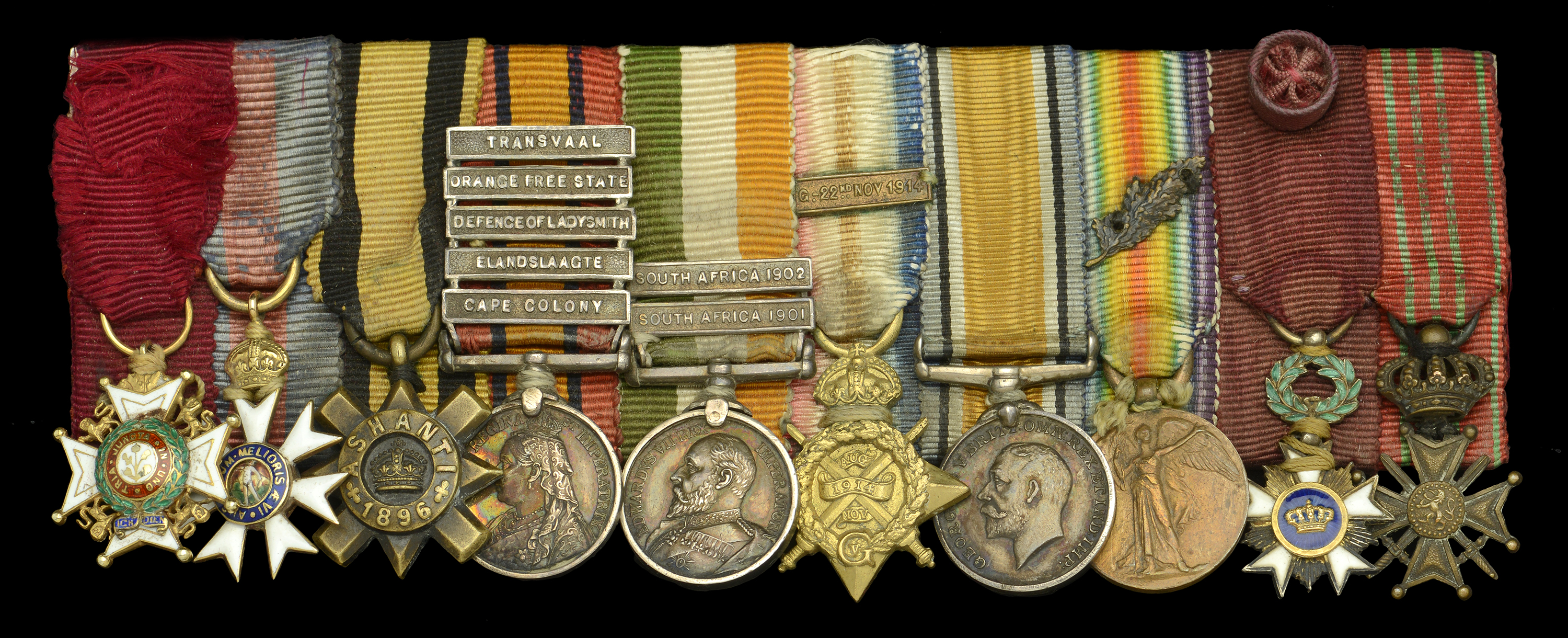The mounted group of ten miniature dress medals attributed to Major-General (Surgeon) Sir Robert Porter, Royal Army Medical Corps The Most Honourable Order of the Bath, K.C.B. (Military) Knight Commander’s badge, gold and enamel; The Most Distinguished Order of St. Michael and St. George, C.M.G., Companion’s badge, gold and enamel; Ashanti Star 1896; Queen’s South Africa 1899-1902, 5 clasps, Cape Colony, Elanslaagte, Defence of Ladysmith, Orange Free State, Transvaal; King’s South Africa 1901-02, 2 clasps, South Africa 1901, South Africa 1902; 1914 Star, with clasp; British War and Victory Medals, with M.I.D. oak leaves; Belgium, Kingdom, Order of the Crown, Officer’s badge, silver-gilt, gold and enamel, with rosette on riband; Croix de Guerre, A.I.R., bronze, mounted court-style as worn, good very fine and better (10) £500-£700 --- Provenance: Dix Noonan Webb, September 2002. The recipient’s full-sized awards sold in these rooms as part of the Colonel Riddick Collection of Medals to the Medical Services in December 2006. Robert Porter was born in Co. Donegal on 31 January 1858, and educated at Foyle College, Londonderry, Glasgow University and Paris, qualifying as a M.B. at Glasgow in 1879. Entering the Army Medical Department as a Surgeon, and afterwards Surgeon-Captain in February 1881, he was promoted to Surgeon-Major in February 1893. He served in the Ashanti Expedition of 1895-96 for which he received an honourable mention. Next serving in the Boer War, he was promoted to Lieutenant-Colonel on February 1901, and was present in operations in Natal during 1899, including actions at Elandslaagte and Lombard’s Kop and in the defence of Ladysmith. He served for the remainder of the war in the Transvaal, Orange Free State and Cape Colony. Promoted to Colonel in January 1910, he was briefly placed on Half Pay on 14 January 1914. Restored to Full Pay with the onset of war, Porter served in France and Flanders with the original British Expeditionary Force as Deputy Director of Medical Services, being ranked as Temporary Surgeon-General, Army Medical Staff in November 1914 and Surgeon-General (ranking as Major-General) in February 1915. From 1915 to 1917 he was Director of Medical Services to the Second Army. For his wartime services he was awarded the C.B. in 1916, C.M.G. in 1919, the Belgian Order of the Crown 3rd Class and Croix de Guerre, and was six times Mentioned in Despatches (London Gazettes 19 October 1914, 17 February 1915, 22 June 1915, 1 January 1916, 29 May 1917, and 24 December 1917). He was knighted, receiving the K.C.B. in 1921. Major-General Sir Robert Porter died on 27 February 1928, The Times of 28 February giving the following: ‘Sir Robert Porter was one of the distinguished group of “War Doctors” who built up on the Western Front the finest organisation for the relief of the wounded which had ever existed. He came to his great work as Director of Medical Services of the Second Army with a distinguished record and with a reputation for thoroughness in all that he undertook, between the years 1915 and 1917 that reputation was justified’.


